* You are viewing Posts Tagged ‘History of Science’
James Brown
July 04, 2011
Events, Lectures, Project Updates
Tags: Astronomy, Europe, History of Science, John Wallis, Mathematics, Networks, Oxford, Royal Society, Seventeenth Century
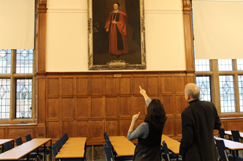
Kneller's 1699 portrait of Wallis in situ.
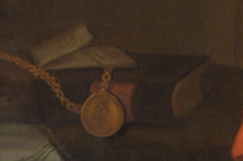
A telling epistolary detail.
In the eighth and final paper of our second seminar series on Thursday 23 June, our very own Dr Philip Beeley (University of Oxford) brought proceedings to a strong finish with a paper entitled ‘Oxford Science and the Republic of Letters: The Correspondence Networks of John Wallis’. Drawing on his intensive research on Wallis’s letters – two hard-copy editions of which he is preparing for publication with the support of the Project – Beeley argued that, in the absence of direct patronage, Wallis’s 246 individual correspondences enabled the mathematician, cryptographer, and (from 1649) Savilian Professor of Geometry to establish a name for himself within the broader European Republic of Letters. Indeed, the importance of epistolarity to Wallis is iconographically symbolised by the prominence of an opened letter in Kneller’s 1699 portrait of him (pictured), which now hangs in the University’s Examination Schools. Focussing on case studies, Philip used Wallis’s harmonious communications with the Danzig astronomer Johannes Hevelius to show how epistolary exchanges between distant friends could facilitate the kind of productive intellectual commerce and collaboration idealized by Comenius, Hartlib, and (in the context of the early Royal Society) Henry Oldenburg. However, switching his focus to Wallis’s more turbulent astronomical entanglements with the Dutch mathematicians Christiaan Huygens and Frans van Schooten, Beeley reminded us that the Republic of Letters was far from a gentleman’s club, and that interpersonal rivalries, methodological disuputes, accusations of plagiarism, and the quest for success and status remained powerful influences on scientific discussion throughout the second half of the seventeenth century. Questions focused on letters, mathematical pedagogy, and disciplinary formation; the importance of the patronage of Mary Vere during the first part of Wallis’s career; and unwritten codes of conduct and behaviour within the Republic of Letters. For past lectures in the series, please see the seminar webpage; details of the 2011 series will be available shortly.
 Podcast now available on the seminar page!
Podcast now available on the seminar page!
James Brown
June 26, 2011
Events, Lectures, Project Updates
Tags: Databases, Eighteenth Century, Hans Sloane, History of Medicine, History of Science, Networks, Seventeenth Century, Visualization
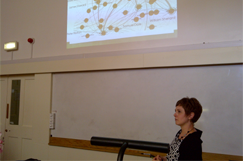
Dr Smith during her talk.
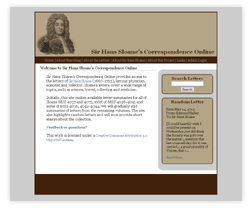
For the seventh and penultimate paper of our seminar series on Thursday 16 June, Dr Lisa Smith (University of Saskatchewan) described her recent efforts towards ‘Visualizing Hans Sloane’s Early Correspondence Networks’. Despite neglect in the historiographies of medicine and science, Smith described Sloane as a facilitator or ‘supermediator’ central to the activities of the early Royal Society as well as the lives of his patients, who corresponded voluminously despite his small number of formal publications. Indeed, Smith is in the process constructing a relational database of Sloane’s many letters – Sir Hans Sloane’s Correspondence Online – which she demonstrated during the talk, and which provided the raw data for the network visualizations. Emphasising that the resource is a work in progress (although an impressive 1,641 letters have been catalogued so far), Smith described the ‘back’ and ‘front’ ends of the catalogue – like our own digital resource, a sophisticated editorial interface sits beneath the search and browse functions – which allows users to explore and filter the Sloane corpus by a full range of standard epistolary metadata as well as a variety of medical themes and keywords, both contemporary and modern. Transcriptions are also being made available, while digital images of the original manuscripts are also in the pipeline. In the second half of her talk, Smith used visualizations of the data created with the recent Yifan Fu algorithm to explore several of the most interesting networks revealed by the correspondence; a surprisingly continental set of relationships, in which connections of patronage, marriage, and friendship loom large. Smith concluded by arguing that network visualizations derived from large datasets are vital in revealing intricacies and overlaps between groups of individuals which would not otherwise have been perceivable, and are of special value in highlighting clusters of relationships (or networks within networks) which can then be reconstructed in more detail. Seminars take place in the Faculty of History on George Street on Thursdays at 3pm. For future talks in the series, please see the seminar webpage.
 Podcast now available on the seminar page!
Podcast now available on the seminar page!
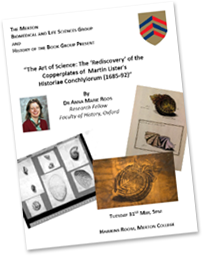 Post edited to add photographs
Post edited to add photographs
A lecture by our Martin Lister Research Fellow Dr Anna Marie Roos on ‘The Art of Science: The ‘Rediscovery’ of Martin Lister’s Historiae Conchyliorum (1685-92)’ will take place at 5pm on Tuesday 31 May in the Hawkins Room of Merton College. The event is a joint meeting of the Merton Biomedical and Life Sciences and History of the Book research groups. Anna Marie is a leading authority on the history of science and medicine in early modern England. Alongside her work for Cultures of Knowledge (for which she is editing Lister’s correspondence), she has published widely in the history of chemistry, as well as on magic and astrological medicine. Her talk will focus on the stunning series of copperplates created by Lister’s teenage daughters to illustrate his groundbreaking compendium of shells, the rediscovery of which last year aroused a great deal of interest.
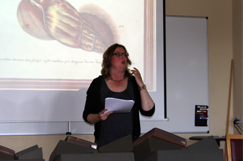
Anna Marie during her talk.
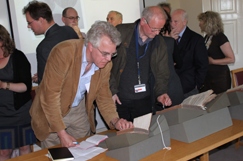
Listerian material from Merton’s holdings.
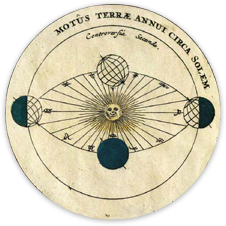 Update: Deadline extended to 18 October
Update: Deadline extended to 18 October
Paper and panel proposals are invited for Scientiae, a new interdisciplinary conference on early modern science, to be held in Vancouver, B.C. (under the auspices of Simon Fraser University) on 26–28 April 2012. According to the organizers, ‘[t]he working assumption of the conference is that interdisciplinarity is not only an option, but a necessity, for the study of early modern culture in its knowledge of the natural world. That is because period science is itself an interdisciplinary function, emerging from Biblical exegesis, advanced design, and literary humanitas; as well as from natural philosophy, alchemy, craft traditions, etc… Scientiae offers a forum for scholars of the period’s art and literature, as well as its intellectual history, to illuminate aspects of early modern science in the latter’s proper strangeness’. The deadline for proposals is 30 September 2011. For the full CFP, please visit the conference website.
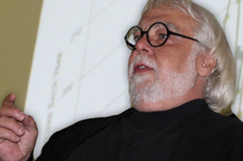
Professor Hatch during his talk.
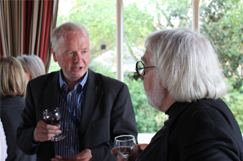
Discussions continue over wine.
In the opening paper of our second seminar series on Thursday 5 May, Professor Robert A. Hatch (University of Florida) got us off to a rousing start with a paper entitled ‘De-Centring the Big Picture: The Scientific Revolution and the Republic of Letters’. In a wide-ranging and suggestive analysis, Hatch argued that correspondence networks were the foremost facilitators of the new science in the early modern period (and vice versa), and for the creation and of vibrant intellectual communities around emergent fields such as astronomy. Compared to printed texts, suggested Hatch, letters were immediate and inclusive, situated the discussion of intellectual themes within the minutia of daily life, and were the primary medium for the gestation and discussion as well as the ultimate dissemination of scientific ideas in this period. The importance of scribal publication as an end in itself throughout the seventeenth century was further emphasized during discussion. Hatch illustrated his talk with a dazzling series of maps and graphs generated from his impressive personal database of scientific correspondences (which includes metadata on the letters of Peiresc, Gassendi, Bouilliau, and many other luminaries), although the necessity of combining quantitative exercises with qualitiative assessments of the formation of epistolary archives was underlined during a lively question and answer session. Seminars take place in the Faculty of History on George Street on Thursdays at 3pm. For future talks in the series, please see the seminar webpage.
 The Edward Worth Library, Dublin, is offering a single one-month fellowship to be held in 2011, to encourage research relevant to its collections. The Worth Library is a collection of 4,500 books, left to Dr Steevens’ Hospital by Edward Worth (1678-1733), an early eighteenth-century Dublin physician. The collection is particularly strong in three areas: early modern medicine, early modern history of science and, given that Worth was a connoisseur book collector interested in fine bindings and rare printing, the History of the Book. Research does not, however, have to be restricted to these three key areas. Further information about the collection and our catalogues may be found on the library’s website. The closing date for applications is 14 April 2011. For further details and application procedures please contact: Dr Elizabethanne Boran, Librarian, The Edward Worth Library, Dr Steevens’ Hospital, Dublin 8, Ireland (elizabethanne.boran[at]hse.ie). You can download the advertisement here (doc).
The Edward Worth Library, Dublin, is offering a single one-month fellowship to be held in 2011, to encourage research relevant to its collections. The Worth Library is a collection of 4,500 books, left to Dr Steevens’ Hospital by Edward Worth (1678-1733), an early eighteenth-century Dublin physician. The collection is particularly strong in three areas: early modern medicine, early modern history of science and, given that Worth was a connoisseur book collector interested in fine bindings and rare printing, the History of the Book. Research does not, however, have to be restricted to these three key areas. Further information about the collection and our catalogues may be found on the library’s website. The closing date for applications is 14 April 2011. For further details and application procedures please contact: Dr Elizabethanne Boran, Librarian, The Edward Worth Library, Dr Steevens’ Hospital, Dublin 8, Ireland (elizabethanne.boran[at]hse.ie). You can download the advertisement here (doc).


Podcast now available on the seminar page!






 Update: Deadline extended to 18 October
Update: Deadline extended to 18 October 

 The
The 
 Join
Join 